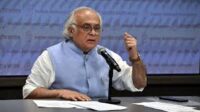Santiago, Oct 25 (AFP/APP):A year to the day after more than one million people thronged downtown Santiago in the biggest march of Chile’s social uprising, Chileans vote Sunday on whether to change the country’s dictatorship-era constitution.
Voters are expected to turn out in numbers, spurred on by slogans that scream from the graffiti-scrawled walls of central Santiago, harking back to the violence-scarred protests that left 30 people dead and thousands wounded.
“Chile decides,” and “I want peace so I’m voting Reject!” shout inscriptions in the city center, where blue-jacketed copies of the constitution — which critics say favored the wealthy — are selling as souvenirs.
“Learn how they privatized our water,” bawled one vendor from a kiosk on the central Paseo Huerfanos street.
A protest movement which had daily drawn thousands onto the streets reached critical mass on October 25, 2019, and the within weeks President Sebastian Pinera had agreed to initiate a process to draft a new constitution.
Demand for a new constitution had been a recurring theme of the protests, set off by a hike in public transport fares. They rapidly turned into widespread demonstrations against social and economic inequalities — encompassing health, education and pensions — inherited from Augusto Pinochet’s 1973-1990 rule.
Chileans will be asked two questions on the ballot papers: to approve or reject a new constitution, and if necessary, what kind of body should draft it — a mixed assembly composed equally of lawmakers and citizens, or a 155-member convention made up entirely of citizens.
Support for new constitution
Opinion polls show more than 70 percent support a new constitution, with just 17 percent voting for rejection.
Polls also indicate similar backing for a constituent all-citizen convention, to be elected in April 2021.
Their draft would be put to another referendum in 2022.
“A first aim of this constitutional process is to leave behind the shadow of Pinochet’s dictatorship, in order to draw up a new constitution without the original sin of having been established under the use of force,” Marcelo Mella, a political scientist at the University of Santiago, told AFP.
The second objective, Mella added, “is to be able to resolve through political and peaceful means the problems that have become structural and that trivialize the functioning of the Chilean democracy,” such as inequality and social exclusion.
Rejectionists, including conservative lawmakers, warn that the constitutional process could undermine the decades of economic stability underpinned by the existing constitution, and deter foreign investment.
Polling stations open at 8:00 am (1100 GMT) and close at 8:00 pm, two hours longer than usual to allow voters enough time and avoid overcrowding due to the coronavirus pandemic which has hit Chile hard.
Chile surpassed 500,000 Covid-19 cases on Saturday, with nearly 14,000 deaths, lending some uncertainty to the likely turnout in a country where voting is voluntary.
The referendum “is taking place in the midst of a pandemic that requires overcoming fear in order to go to the polls,” said Gloria de la Fuente, head of the Chile 21 Foundation political research group, in a newspaper column.
Authorities have introduced special health measures in voting stations to try to ensure public safety during Sunday’s referendum.
Tables, chairs and other furniture have been disinfected in all voting centers.
At the National Stadium in Santiago, which is expected to welcome around 300,000 voters, disinfection teams have been spraying the facilities with copper nanoparticles.
Stay tuned to Baaghi TV for latest news and updates!






